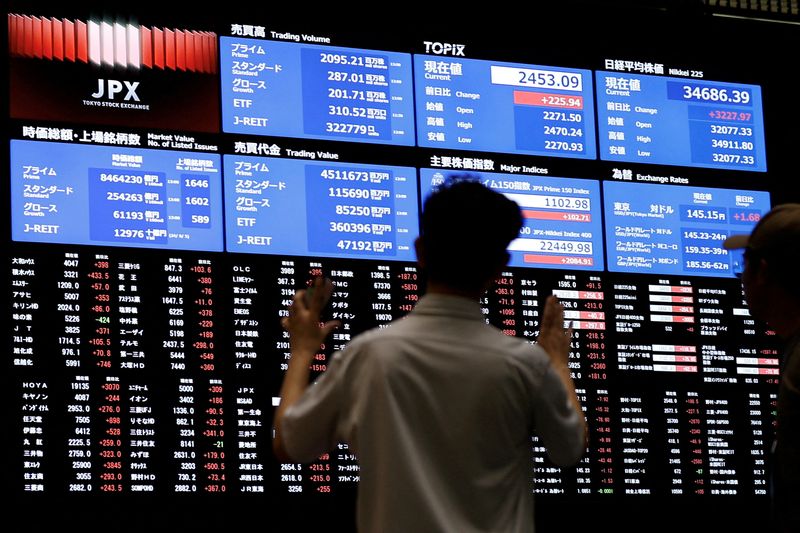Global stocks drop and yen rises as volatility reigns

By Harry Robertson and Kevin Buckland
LONDON/TOKYO (Reuters) – European stocks fell and U.S. futures slipped on Thursday after turbulent sessions in Asia and on Wall Street, as investors struggled to find their footing in a wild week for markets.
The yen and U.S. bonds rose as traders waited for U.S. weekly jobless claims data, which has taken on extra significance after weak employment numbers helped spark Monday’s market rout.
Europe’s continent-wide index fell 1% in early trading after climbing 1.5% on Wednesday. index was down 0.6% and 100 dropped 1.1%.
Futures for the U.S. were down 0.4%. The index fell 0.8% the previous day, having given up gains of as much as 1.7% in morning trading.
“When you have a volatility shock like this, and you have a degree of unwind in certain positions, you’re very prone to sudden reversals and also a degree of uneasiness as the adjustment continues,” said Erik Nelson, macro strategist at Wells Fargo.
“I would be surprised if we just went back to everything being fine.”
share index swung from early losses of as much as 2.5% and gains of 0.8% before finishing 0.7% lower.
Weak U.S. jobs data last week has combined with a dramatic rally in the Japanese yen and concerns about an artificial intelligence bubble to send stocks tumbling.
The S&P 500 tumbled 3% on Monday and sits 2.8% lower for the week – although it remains around 9% higher for the year.
YEN BOUNCES AROUND
Japan’s yen rebounded somewhat on Thursday, adding to investor unease, after dropping around 1.6% on Wednesday. The dollar was last down 0.6% at 145.76 yen.
The yen has surged 11% since hitting a 38-year low in July, helped by intervention from authorities, a surprise Bank of Japan rate hike, and a U.S. jobs slowdown that has weighed on the dollar.
The rally has forced investors to dramatically unwind carry trades, where they borrow cheaply in Japan to buy dollars and other currencies to invest in higher yielding assets such as bonds and tech stocks, and helped trigger a 12% plunge in Japanese stocks on Monday.
Deputy BOJ Governor Shinichi Uchida on Wednesday played down the chance of another near-term hike, but minutes released on Thursday revealed a hawkish slant among the board.
The was down 0.2% at 102.93, after hitting an eight-month low of 102.69 on Monday. The euro and the pound ticked higher.
The yield on the benchmark 10-year U.S. Treasury note was last down 6 basis points (bps) at 3.909%, after rising on Wednesday following a weak debt auction.
It is down 9 bps for the week after hitting its lowest since June 2023 on Monday as traders fled to safe-haven assets and ramped up their bets on Federal Reserve rate cuts. Yields move inversely to prices.
“During recent volatility episodes… the promise or pricing of aggressive Fed rate cuts has proven to be as effective as actual rate cuts, via the loosening in financial conditions,” said Tony Sycamore, an analyst at trading platform IG.
Traders on Thursday expected around 110 bps of cuts from the Fed this year. Weekly U.S. jobless claims data at 1230 GMT (8.30 a.m. ET) could shift those expectations.

Crude oil was flat after rising the previous day when data showed a bigger-than-expected drawdown in stockpiles.
futures added 0.1% to $78.42 a barrel. It hit an eight-month low of $75.05 a barrel on Monday.








